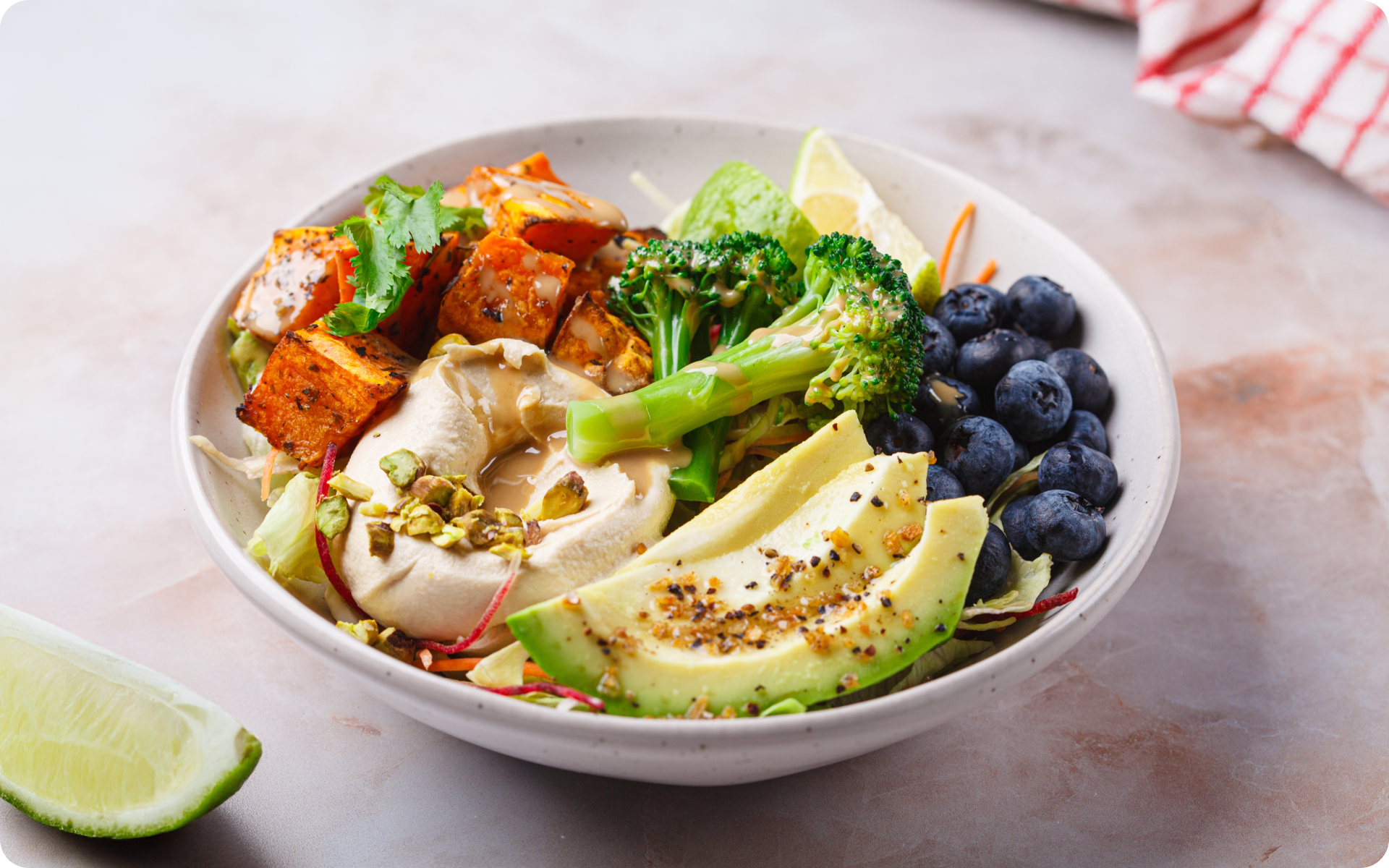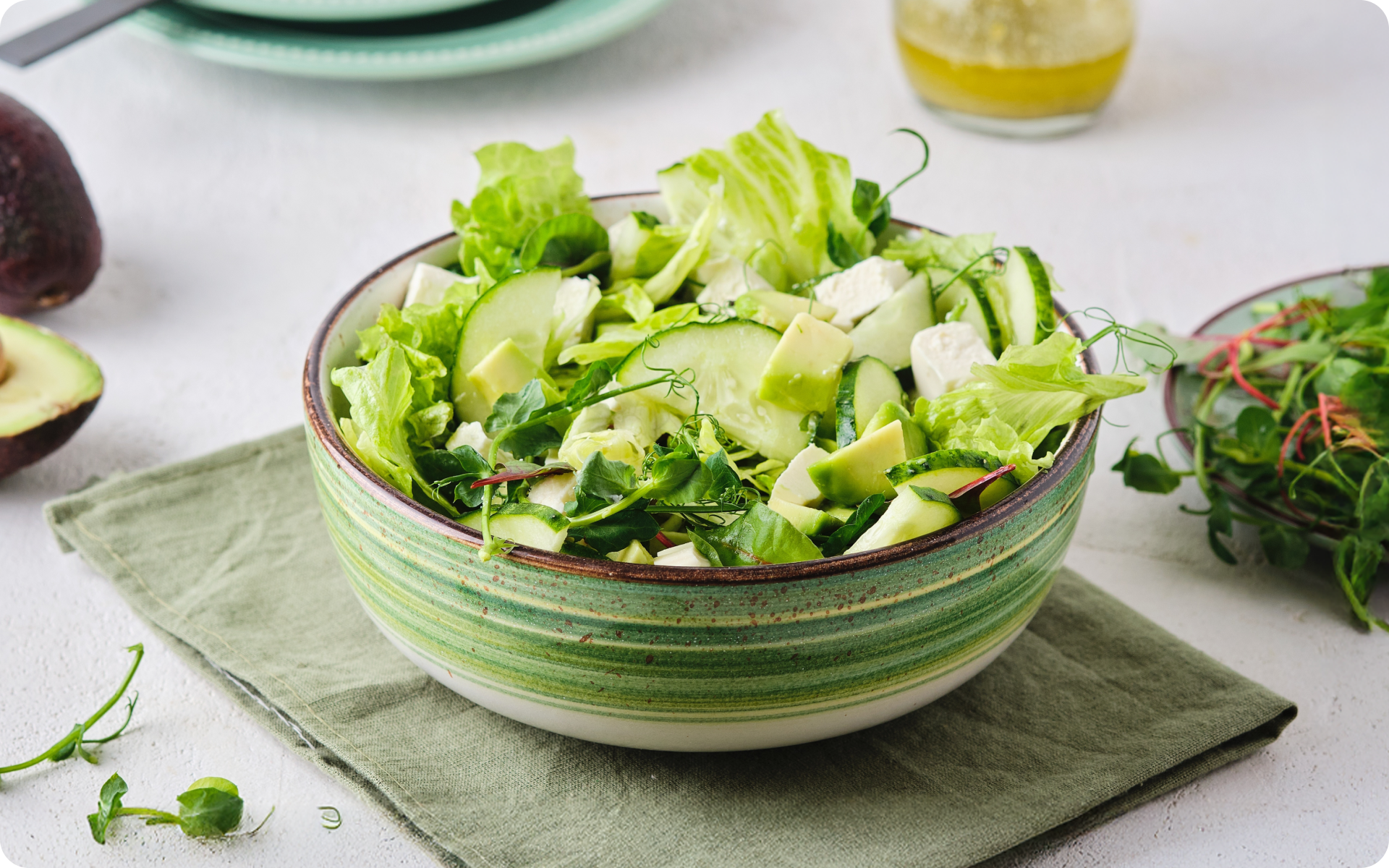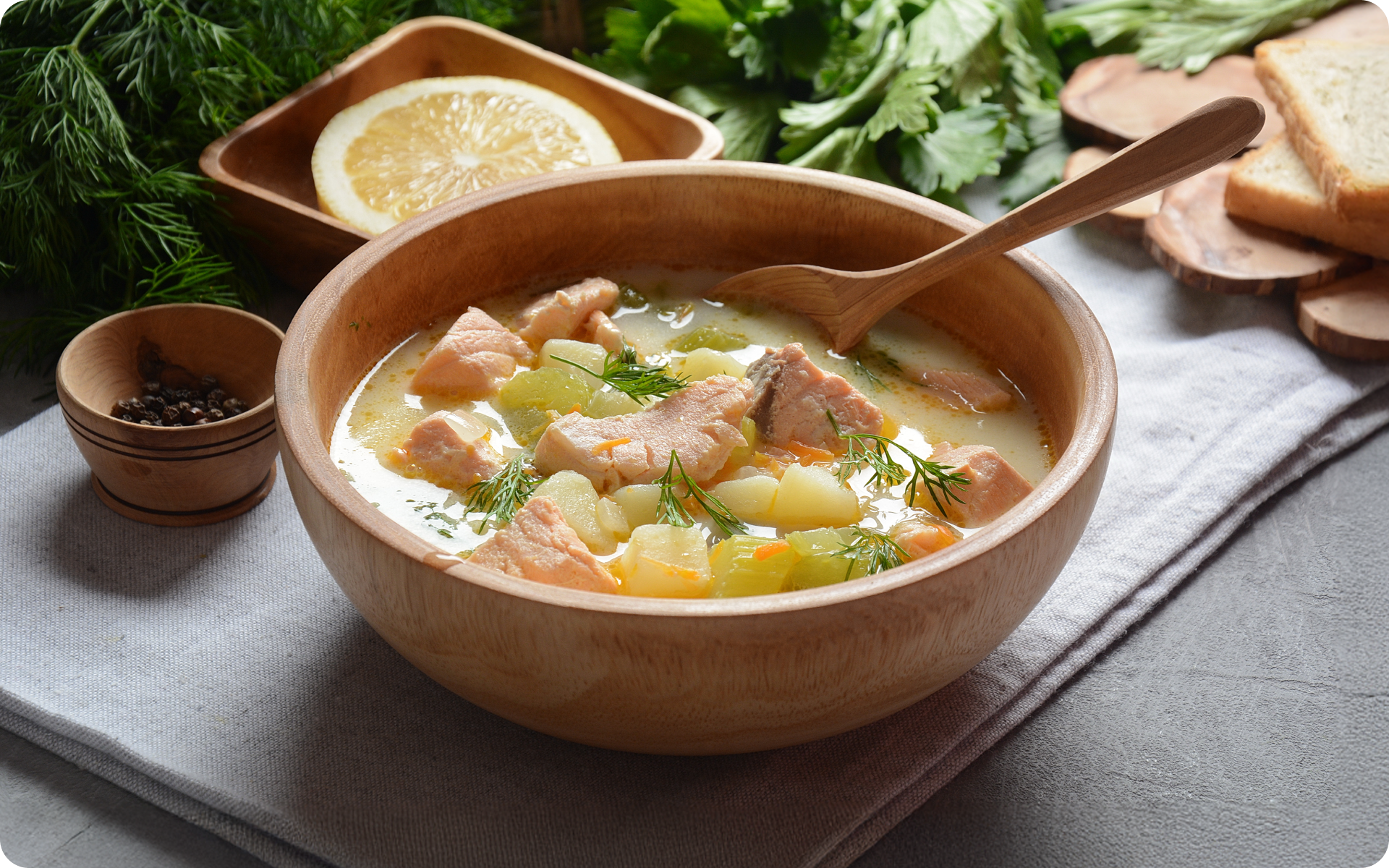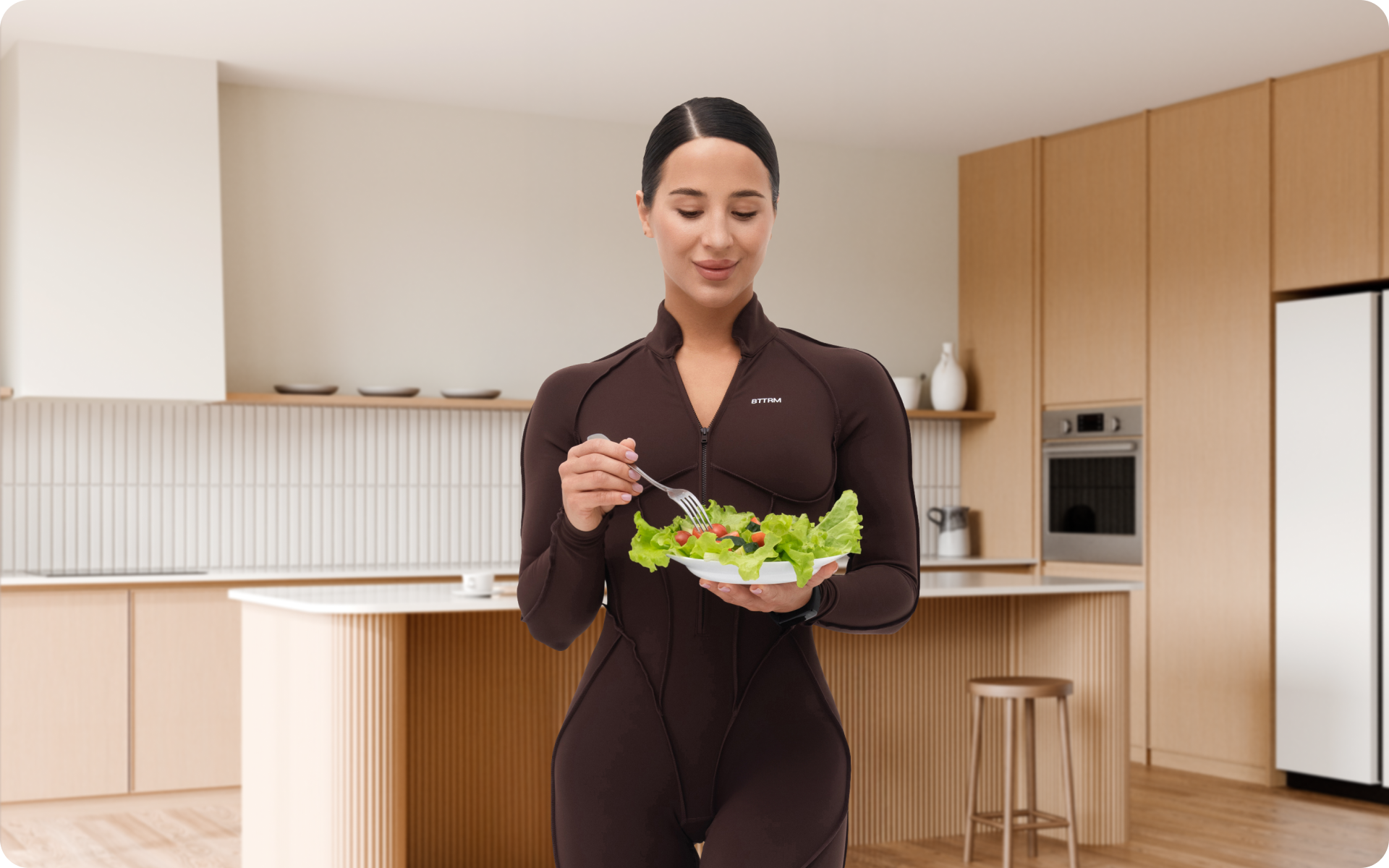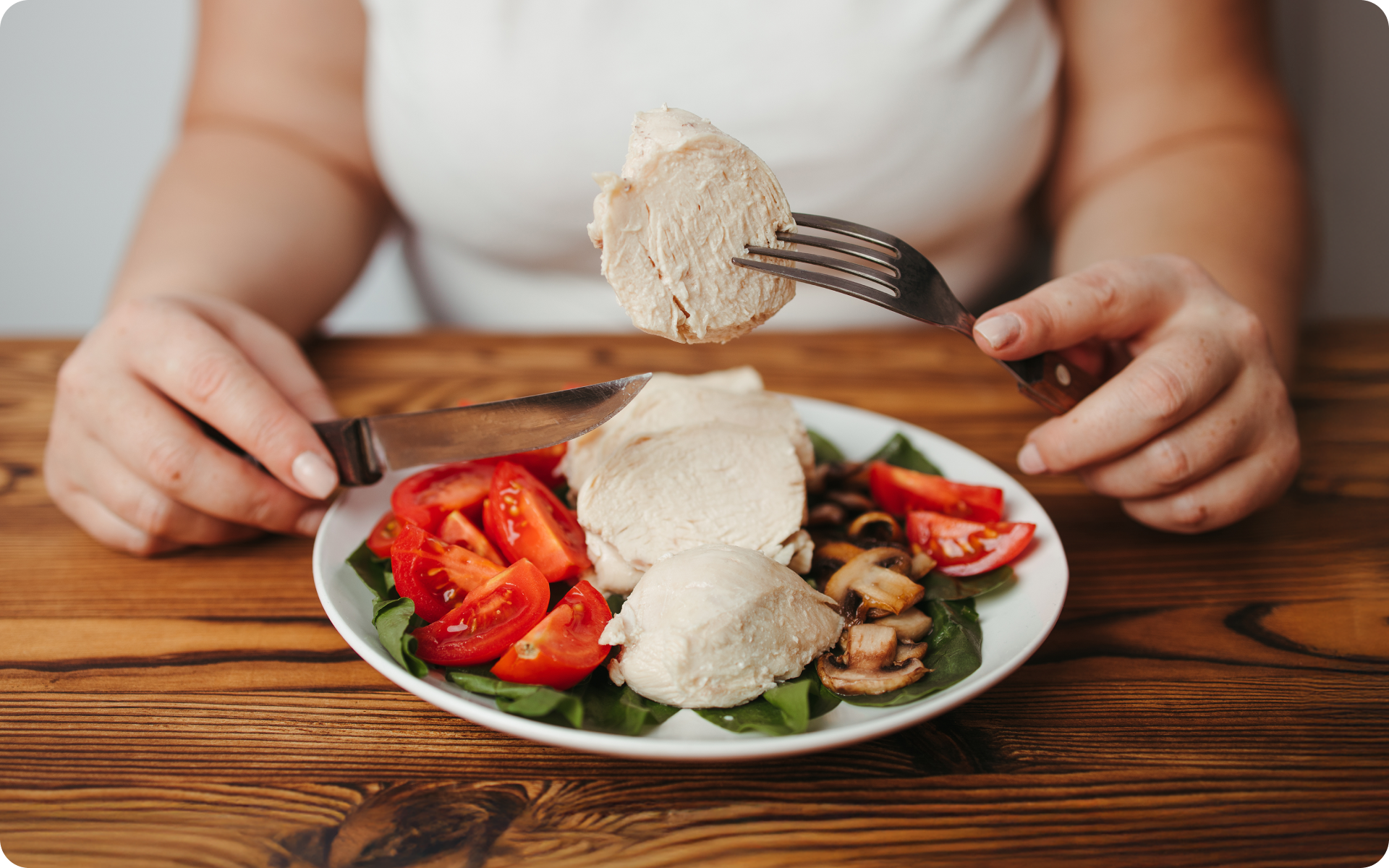When it comes to changing your body, two things are certain – exercise matters, but diet comes above all. While exercise helps push your body to being what you need it to be, diet is the building block that determines if this is even possible to begin with.
If you’re looking to lose weight, the 1,300-calorie diet may be a good place to start. But how can you use the 1,300-calorie diet meal plan to help you reach your weight loss goals? Can going on such a meal plan and monitoring your 1,300-calorie diet macros help you lose fat and perhaps even gain muscle?
Read on to find out.
What Is a Good 1,300-Calorie Diet?
What does a good 1,300-calorie diet contain? Chances are that a 1,300-calorie diet weight loss meal plan can help you achieve your weight loss goals, if it’s an appropriate number of calories for you. However, such a plan won’t work if you don’t fill the meal plan with good healthy and nutritious foods.
Food Groups to Have on a 1,300-Calorie Diet
Whole-grain cereals and foods
This includes options such as brown rice, millet, oatmeal, and whole-wheat bread. Not only do whole grains contain fiber, vitamins, minerals, and other nutrients, they also help control cholesterol levels, weight, and blood pressure, which lowers the risk of diabetes, heart disease, and other conditions.
It’s important to note that whole grains have more fiber than refined grains (7). Research on the intake of fiber has shown that higher fiber intakes are associated with lower body fat, increased lean mass, and other health benefits (8).
Protein
This can be from plant or animal protein.
Plant protein sources include chickpeas, lentils, peas, kidney beans, black beans, soybeans, pinto beans, and navy beans. In terms of animal protein, lean protein is better than high-fat meats. Examples include boneless and skinless chicken breasts, turkey breast, pork tenderloin, fish and seafood, salmon, and scallops.
If your goal is weight loss and perhaps some muscle growth, a 1,300-calorie meal plan high-protein diet is your best option if 1,300 is enough calories for you.
Protein is the building block of muscle and research also suggests that a higher intake of this macronutrient may help prevent or treat obesity and obesity-related diseases, in addition to helping with the improvement of body weight management through modulations in energy metabolism, appetite, and energy intake (14, 3).
Yanking yourself back in shape has never been so easy with our game-changing fitness app! Start transforming your life with BetterMe!
Nuts and seeds
Nuts such as almonds, pistachios, walnuts, cashews, pecans, macadamia nuts, and hazelnuts are excellent for any weight and fat loss diet as they’re both high in protein and fiber, in addition to healthy fats.
Seeds such as chia, flax, sunflower, sesame, and hemp are high in nutrients such as healthy fats, fiber, vitamins, minerals, and protein, which makes them great for health and weight management.
Dark leafy greens
These include kale, collard greens, spinach, cabbage, beet greens, and lettuce.
Not only are dark leafy greens rich in fiber and low in calories and carbs (which makes them perfect for a 1,300-calorie diet low-carb plan), they’re also rich in vitamins A, C, E, K, and B, as well as minerals such as iron, magnesium, potassium, and calcium.
A diet that is rich in leafy greens may help protect your heart health and reduce your risk of cancer, osteoporosis, and other inflammatory diseases (4).
Fruits
If you can, choose whole fruits instead of fruit juices. Whole fruits don’t contain added sugars and have fiber, which is good for calorie management and digestion.
Your fruit options include bananas, oranges, apples, pineapples, watermelons, peaches, grapefruits, avocados, blueberries, mangoes, strawberries, and pomegranates.
Low-fat dairy products
Unless you have an issue with lactose (or you’re vegan), there really isn’t any need to take dairy out of your diet.
A review on the effects of low-fat dairy on weight suggested that increasing low-fat dairy foods to 4–5 servings a day and/or increasing calcium and vitamin D intake by supplements may be beneficial for weight loss/maintenance (13).
Doing this may also lead to more favorable bone and body composition outcomes in postmenopausal women during moderate weight loss (13).
Will You Lose Weight Eating 1,300 Calories a Day?
Weight gain is typically caused by eating more calories than your body needs/burns in a day. This is also known as a calorie surplus. Weight maintenance happens when you eat approximately the same number of calories as your body burns.
Weight loss occurs when you consume fewer calories than your body needs/burns in a day. This is known as a calorie deficit.
To maintain their weight, the average man or woman should consume 2,500 or 2,000 calories respectively, although this varies according to individual factors. To lose weight, a calorie deficit of 500 kcal to 1,000 kcal a day is recommended (2), which makes the 1,300-calorie diet meal plan a good option for some people to cut some extra weight.
If you calculate your daily calorie intake – this is best done using a reputable calorie counter app – and you realize you’ve been eating more than 1,300 kcals a day, then cutting your intake to 1,300 kcals a day may help you lose weight. However, 1,300 calories is not enough for everyone. Cutting your calorie intake too low can lead to nutrient deficiencies and may even slow your metabolism, which makes it more difficult to lose weight.
How to Stick to a 1,300-Calorie Diet
Starting a new diet can be difficult. It gets even harder if the diet in question requires you to eat less than you ate before. Here are some tips to help you stick to your 1,300-calorie gluten-free diet, a 1,300-calorie keto diet, or any other calorie-deficit eating plan:
Don’t give up if the results are not instant
Weight loss is not a magic trick and it doesn’t happen instantly. There are several factors that determine how fast you can lose weight, including age, genes, weight, and lifestyle.
Be patient and keep trying. If a long period passes without any significant changes, it’s advisable to see a professional as this may not be the recommended plan for you.
Plan ahead
To ensure you follow the plan to the letter, it’s a good idea to prepare beforehand. This means knowing what you’re going to eat on Thursday as early as Monday. Make sure you have all the necessary ingredients in advance.
You don’t want to be making a meal for your 1,300-calorie meal plan high-protein diet, only to find out you don’t have what you need. A little advanced preparation can make it as easy as possible to stick to your plan.
Do it with someone
As with work or anything that can be tedious or boring, it becomes easier and better when it’s done with someone. Find a person who wants the same results as you and start the plan with them. This can be your spouse, a relative, a friend, or even a colleague.
On days when you’re feeling lazy or you don’t want to follow the diet, they will be there to keep you going. These people act as your accountability partners. The best part is that you can do it with more than one person – the more, the merrier.
Read more: 7-Day Weight Loss Low-Carb Diet: Choose High-Protein, High-Fiber, or Ultra-Low-Carb
Set small and realistic goals that will help you achieve your big goals
If you plan to lose 30 pounds in 6 months, you should set weekly goals and monthly goals. They will help you continue to be motivated.
Keep an eye on the snacks you eat
It’s very easy to go over your 1,300-calorie limit if you don’t pay attention to the calories in your snacks. Choose fruit and vegetable-based snacks as they’re healthy and also low in calories. Homemade snacks are also always better as you can track what’s in them. If you prefer pre-made snacks, read the packaging to see what you’re eating.
Don’t miss any meals
When you skip a meal, you almost always end up overindulging at the next meal or choosing unhealthy options. If you realize that you don’t have time to sit still and eat a full meal during the day, pack smaller balanced meals and healthy snacks that you can eat throughout the day.
If all else fails, consult an expert
It’s common to always want to accomplish things by yourself, but sometimes, despite our best efforts, we need help. If this has happened to you before or is happening now, don’t give up.
Enlist the help of a professional to guide you on how to overcome this hurdle. If you can’t afford an expert, there are many apps that can help you with this. The BetterMe app can help you with your weight loss journey.
Keep yourself hydrated
Not only does water prevent dehydration, it may help with weight loss. Research and expert advice states that in the short term, increased water intake increases your metabolic rate slightly. This helps with calorie burning and reduces appetite, which can help you maintain a calorie deficit (6, 5).
Limit your stress triggers and sleep early
Sleeping better helps you feel energized and avoid the increased hunger and cravings that sometimes come with sleep deprivation. Stress is one of the many reasons for unexplained weight loss, but it can also prevent weight loss or even cause you to add some extra pounds. Increased stress levels and less sleep can also be detrimental to your mental health (12, 10).
If you wish to cinch your waist, tone up your bat wings, blast away the muffin top – our fitness app was created to cater to all your needs! BetterMe won’t give excess weight a chance!
Is 1,300 Calories Realistic?
It can be.
As seen above, a woman should eat 2,000 calories per day on average to maintain her weight, and she should limit her caloric intake to 1,500 or less in order to lose one pound per week (2). A calorie deficit of 500 to 1,000 kcals a week is considered enough to start weight loss. Therefore, consuming 1,300 kcals a day can be enough for some women.
However, if you’re living an active lifestyle and working out, 1,300 may be too little for you. Use a calorie-counting app and log your daily activities to help find your optimal deficit to ensure you’re not undereating.
If you’re using this diet and also following a 1-month workout plan to get ripped, make sure your calorie and protein intake are enough to make it possible.
How Fast Will I Lose Weight If I Eat 1,300 Calories a Day?
There is no telling. Similar to how we gain weight at different rates, we also lose weight at different rates. As long as you’re losing 1 to 2 pounds a week on average, you can rest easy as you’re on the right track and losing the extra pounds at a healthy and sustainable rate.
Why Am I Not Losing Weight on a 1,300-Calorie Diet?
There are many reasons why you may not be losing weight despite being on a diet, including:
- You’re eating too much (at a calorie surplus).
- You’re eating too little – too low a deficit makes the body hold on to fat instead of burning it.
- You’re not sleeping enough or are too stressed.
- You’re losing fat but gaining muscle – muscle weighs the same as fat but occupies less space. Instead of relying on the scale, use other modes such as comparing new and old pictures or trying on clothes to see how they fit.
Read more: 24 Weight Loss Smoothies, 2 Diet Plans, and 5 Belly Fat Smoothie Secrets
FAQs
How much protein should I eat on a 1,300-calorie diet?
When it comes to 1,300-calorie diet macros, 130 to 455 calories a day should come from proteins – this is approximately 33-114 grams.
The Dietary Guidelines for Americans state that of the total calories consumed, 10% to 35% should constitute proteins (9, 1). You can calculate this using this formula:
10/100 * 1300 = 130 calories
35/100 * 1300 = 455 calories
You can also take your weight in kilograms and multiply it by 0.8 to get the minimum number of grams of protein you require each day. Those who want to follow a high-protein diet while on such a meal plan can use the same formula, but use a higher multiplier, such as 1 or 1.2 grams per kilogram.
How many carbs should I eat on a 1,300-calorie diet?
The Dietary Guidelines for Americans 2020–2025 state that an adult’s total daily calories should be 45 to 65% from carbohydrates, 10 to 35% from protein, and 20 to 35% from fat (1). This should be your baseline for calculating how many carbs you should eat on this meal plan.
However, if you would prefer a 1,300-calorie diet low-carb plan, you can adjust your macros, increase the protein and fat, and reduce the carbohydrates to fit your needs.
Can you follow the 1,300-calorie diet with no exercise?
If your goal is to lose weight and the 1,300 kcal diet falls within your 500 to 1,000 calorie deficit from your normal meal plan, then yes, you may be able to follow this diet without exercise and still meet your goals.
However, exercise is always encouraged on any weight loss or muscle-building plan as it helps burn calories and increase muscle mass and strength – all factors that increase the speed and likelihood of your goals. It’s also good for overall health.
Should I follow a 7-day protein shake diet?
No, you should not. Protein shakes are a great way to help boost your protein intake per day. However, only having protein shakes for 7 days a week with nothing else is neither healthy nor balanced. You need a balanced and varied diet to stay healthy, lose weight, maintain it, or gain muscle.
How can I burn 2,000 calories a day?
If you consume 2,000 calories or more a day, you may burn this amount simply by existing (through your basal metabolic rate), the thermic effect, and through daily activities and exercise.
Is it safe to eat 1,300 calories a day?
We all have different calorie needs. For some, 1,300 kcal a day is perfectly safe, while for others, it may be too little. A reputable calorie app will help you determine where you lie on this scale. You can also seek help from a registered dietitian who will help you determine if such a diet is safe for you or not.
How much weight will I lose on a 1,300-calorie diet?
How much weight you lose while dieting is dependent on how long you stay on the diet, how well you follow the meal plan, and whether you work out while on the diet, in addition to other individual factors. Remember, as long as you’re losing 1 to 2 pounds a week, you’ll reach your goal in no time.
DISCLAIMER:
This article is intended for general informational purposes only and does not serve to address individual circumstances. It is not a substitute for professional advice or help and should not be relied on for making any kind of decision-making. Any action taken as a direct or indirect result of the information in this article is entirely at your own risk and is your sole responsibility.
BetterMe, its content staff, and its medical advisors accept no responsibility for inaccuracies, errors, misstatements, inconsistencies, or omissions and specifically disclaim any liability, loss or risk, personal, professional or otherwise, which may be incurred as a consequence, directly or indirectly, of the use and/or application of any content.
You should always seek the advice of your physician or other qualified health provider with any questions you may have regarding a medical condition or your specific situation. Never disregard professional medical advice or delay seeking it because of BetterMe content. If you suspect or think you may have a medical emergency, call your doctor.
SOURCES:
- 2015-2020 Dietary Guidelines (2015, health.gov)
- Calories (2022, ncbi.nlm.nih.gov)
- Clinical Evidence and Mechanisms of High-Protein Diet-Induced Weight Loss (2020, ncbi.nlm.nih.gov)
- Dark Green Leafy Vegetables (2023, ars.usda.gov)
- Does drinking water before meals really help you lose weight? (2024, health.harvard.edu)
- Effect of excessive water intake on body weight, body mass index, body fat, and appetite of overweight female participants (2014, ncbi.nlm.nih.gov)
- Health Benefits of Dietary Whole Grains: An Umbrella Review of Meta-analyses (2017, ncbi.nlm.nih.gov)
- Higher dietary fibre intake is associated with increased skeletal muscle mass and strength in adults aged 40 years and older (2021, pubmed.ncbi.nlm.nih.gov)
- How many carbs should dieters eat for weight loss? (2018, medicalnewstoday.com)
- Impact of a stress management program on weight loss, mental health and lifestyle in adults with obesity: a randomized controlled trial (2018, ncbi.nlm.nih.gov)
- Increased dietary fiber is associated with weight loss among Full Plate Living program participants (2023, frontiersin.org)
- Relationship between stress and weight management behaviors during the COVID‐19 pandemic among those enrolled in an internet program (2021, ncbi.nlm.nih.gov)
- Role of Calcium and Low-Fat Dairy Foods in Weight-Loss Outcomes Revisited: Results from the Randomized Trial of Effects on Bone and Body Composition in Overweight/Obese Postmenopausal Women (2019, ncbi.nlm.nih.gov)
- The role of protein in weight loss and maintenance234 (2015, ajcn.nutrition.org)
